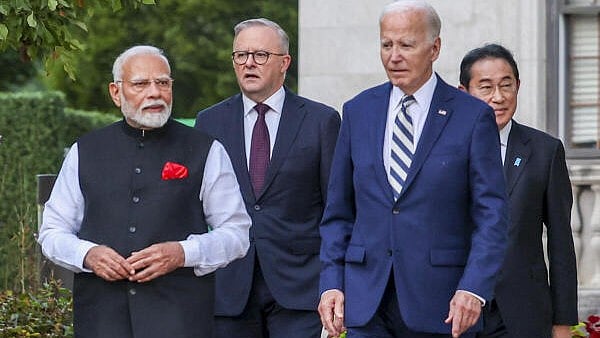
President Joe Biden, Prime Minister Narendra Modi, Australia's Prime Minister Anthony Albanese and the then Japan's Prime Minister Fumio Kishida at the Quad Leaders Summit in US in September.
Credit: PTI Photo
New Delhi: Notwithstanding the uncertainty over the fate of Quad after Donald Trump’s return to the White House in Washington, India on Tuesday joined Japan, Australia and the United States to send a message to China, reaffirming the commitment of the four-nation coalition to the vision of a free and open Indo-Pacific and to responding to the future needs of the region.
External Affairs Minister S Jaishankar and his Japanese and Australian counterparts, Takeshi Iwaya and Penny Wong respectively, joined US Secretary of State Antony Blinken in issuing a statement, commemorating the 20th anniversary of the cooperation among the four nations in the humanitarian and disaster response operations in the wake of the devastation caused by the 2004 Indian Ocean earthquake and tsunami.
“As four partners, we share a vision of a free and open Indo-Pacific that is peaceful, stable, and prosperous, underpinned by effective regional institutions,” they said in the joint statement issued from New Delhi, Canberra, Tokyo and Washington DC.
It was the cooperation and coordination among the four nations in response to the catastrophe that sowed the seeds of Quad, now perceived as a bulwark of democracies to counter the hegemonic aspirations of China in the Indo-Pacific region.
The tsunami, one of the worst disasters in history, claimed the lives of nearly a quarter million people and displaced 1.7 million across 14 countries. India, Japan, Australia and the US contributed over 40,000 emergency responders, working with other partners across the Indo-Pacific region to support millions of people affected by the catastrophe.
“What began as an emergency response to a catastrophe has grown into a full-fledged partnership delivering positive outcomes for the people of our region,” Blinken, Jaishankar, Wong and Iwaya noted. “Quad countries now work together and with partners across the Indo-Pacific to address complex challenges, from fighting climate change, cancer, and pandemics, to bolstering quality infrastructure, maritime domain awareness, STEM (Science, Technology, Engineering and Mathematics) education, counter-terrorism efforts, critical and emerging technologies, and cyber security.”
They also noted that the leaders of the four nations had met annually to drive the Quad’s positive contributions across South Asia, Southeast Asia, and the Pacific.
“The Quad is committed to working together in responding to the future needs of the region,” the foreign ministers of the four nations stated.
The Quad was conceived in 2004 but fizzled out soon after its formal launch in 2007. The bloc was revived in 2017 during the first term of Donald Trump as the US president.
New Delhi in the past resisted the US pressure to turn the Quad into a NATO-like security alliance for the Indo-Pacific. India rather insisted on pursuing a benign agenda to counter China’s bid to spread its military, political, and economic influence in the Indo-Pacific. Trump’s successor in the Oval Office of the White House, Joe Biden, elevated it to the level of the leaders with a virtual summit in March 2021, followed by the first in-person summit in Washington DC a few months later.
Biden hosted Modi, Australian Prime Minister Anthony Albanese and then Japanese Prime Minster Fumio Kishida for the fourth summit of the Quad in Delaware, US, on September 21. The leaders agreed to subtly add a security heft to the organisation, beginning with the coastguard ships of the four nations sailing together for a joint patrolling mission in the Indo-Pacific region in 2025.
With Trump winning the US presidential elections and set to return to the White House on January 20, uncertainty looms large over the approach of Washington towards China and the Indo-Pacific region. New Delhi, however, hopes that Trump will continue the US policy of promoting the Quad and will visit India when Prime Minister Narendra Modi will be hosting the summit of the four-nation organisation in 2025.
“We reaffirm our unwavering support for the ASEAN’s centrality and unity as well as mainstreaming and implementation of the ASEAN Outlook on the Indo-Pacific,” the Quad foreign ministers said on Tuesday. “We respect Pacific-led regional architecture, foremost the Pacific Islands Forum. We are also steadfast in our support for the Indian Ocean Rim Association, the region’s premier organisation.”
